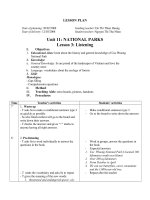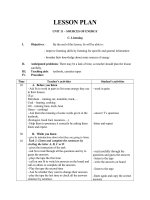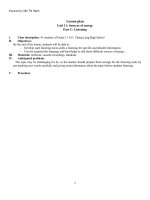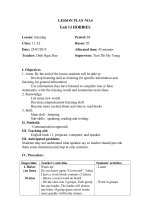English 11- unit 11- listening
Bạn đang xem bản rút gọn của tài liệu. Xem và tải ngay bản đầy đủ của tài liệu tại đây (103.12 KB, 2 trang )
Prepared by Trần Thị Hạnh
Lesson plan
Unit 11: Sources of energy
Part C: Listening
I. Class description: 41 students of Grade 11 A11, Thang Long High School
II. Objectives:
By the end of the lesson, students will be able to:
- Develop such listening micro-skills a listening for specific and detailed information
- Use the acquired the language and knowledge to talk about different sources of energy.
III. Materials: textbook, cassette recordings, handouts
IV. Anticipated problems
The topic may be challenging for Ss, so the teacher should prepare them enough for the listening tasks by
pre-teaching new words carefully and giving some information about the topic before students listening.
V. Procedure
1
Prepared by Trần Thị Hạnh
2
Teacher’s activities Students’ activities
Greeting(2’)
- Greet the whole class: Good afternoon
- Ask Ss to sit down
- Ask Ss some questions:
How are you, today?
Is there anyone absent to day?
-Greet T: Stand up and say: Good
afternoon, teacher.
- Answer T’s questions
Warm-up:
- Divide the whole class in 4 groups.
-Ask each group to name as many sources of energy as possible.
-After 2 minutes, call one representative of each group to come to the
board and write down their answers. Which group has more correct
words will be the winner.
- Ask the whole class to classify whether those sources of energy are
renewable or non-renewable.
-Work in group
- Come to the board and write down the
answers.
-Classify renewable and nonrenewable
sources of energy.
Before listening
- Lead-in the lesson
Today, you are going to listen to a passage about renewable and
nonrenewable sources of energy. After this lesson, you will have deeper
understanding about these sources of energy.
- Before listening, I would like to provide you with some new words in
the listening passage:
New words:
1. Ecology (n): the relation of plants and living creatures to each other
and to their environment; the study of this.
2. Ecologist (n): a person who studies ecology.
3. Fertilize (v): make fertile or productive
4. Conserve (v): keep in safety and protect from harm, decay, loss, or
destruction
-Help Ss pronounce the words correctly.
- Check to make sure that Ss understand the meanings of these words.
.
-Listen to T.
-Study new words and write them down
in their notebook.
While listening
Extra activity: Handout
You are going to listen to the listening passage once and put a tick to
the words in the handout that you can listen.
Handout:
Task 1:
-Lead- in task 2: We will check the answers of task 1 at the end of our
-Listen to the CD and do extra activity
individually.
-Listen to T.
Oceans windmill coal
Fossil fuels land ecologists
sailboat expensive
nuclear environment dam
exhausted solar enrgy
electricity nonrenewable infinite
radiation
Importance potential
Protected release geothermal
replaced
solar resource coal









